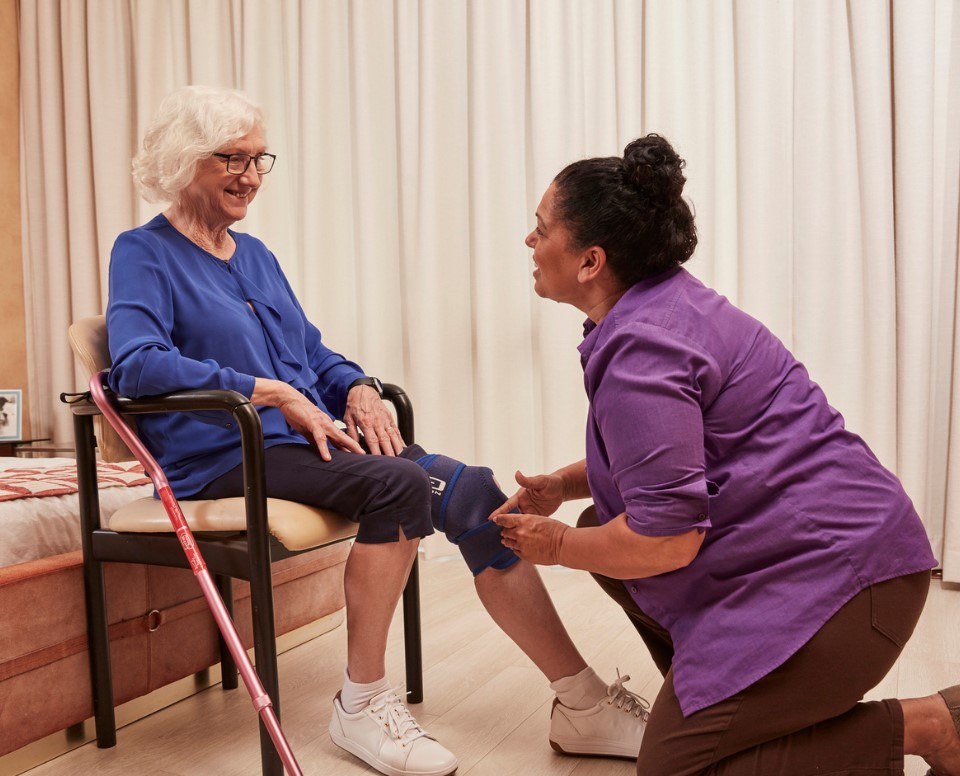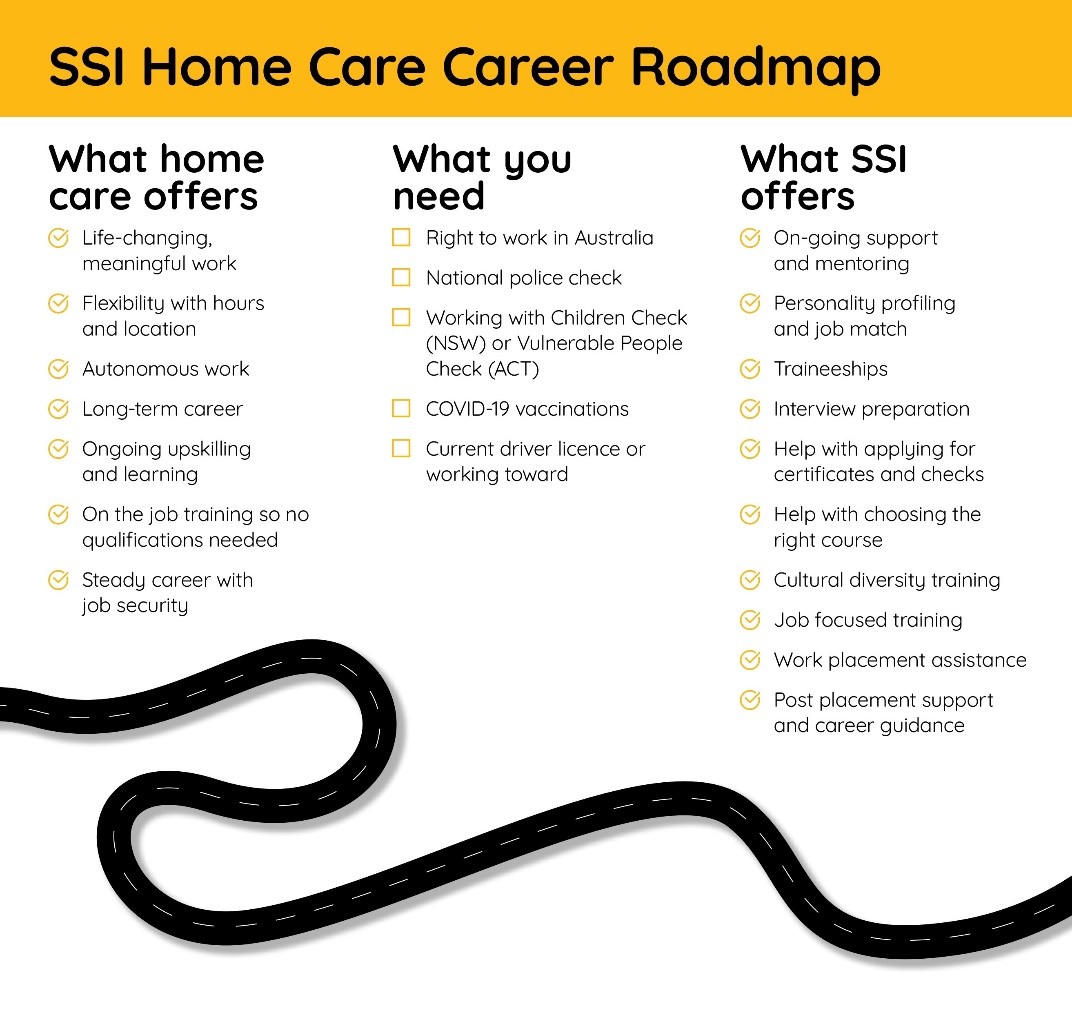In the heart of our communities, there exists a group of unsung heroes! Dedicated individuals who lovingly support our elderly, providing essential services and ensuring that they can age gracefully in the comfort of their own homes. With more and more elderly members looking to remain in their homes, Homecare is now a great flexible career option for people to choose.
Settlement Services International’s (SSI) Home Care Workforce Support program is a free service aimed at helping new talent enter this budding home care sector, ensuring they feel confident and well-prepared with skills required for a successful career in at-home aged care.
The SSI Home Care Workforce Support Program (HCWSP) recognizes the immense contributions of CALD homecare workers and aims to enhance their skills, well-being, and job satisfaction. Let’s delve into the program’s impact through the eyes of those who have walked this path:
What is Homecare?
Thiyagu Ramachandran, another Homecare worker from CALD background sheds light on the kind of support,
“Home care workers support seniors with simple tasks inside and outside the home. We visit them at their homes, helping them with shopping, social outings, light household work, cleaning, helping with medications, cooking, and food preparation, and ultimately, helping seniors to live at home for longer.”
Thiyagu emphasizes the emotional aspect of the role. “It’s not just about tasks; it’s about companionship.”
“We’re not just caregivers; we’re lifelines,” Rob asserts. “And sometimes, a cup of tea and a chat mean the world.”
Sanjida Chowdhury, an Indian homecare worker, who speaks multiple Indian languages, believes that language and cultural understanding are essential in her line of work. “When I speak Hindi or Bengali with my client, her eyes light up,” she shares. “It’s more than just care; it’s connection. It helps bridge gaps while building trust. It’s like bringing a piece of home to them. They love to share stories about family gatherings, festival celebrations and cultural references.”

Why HCWSP?
Rob Hendra stumbled upon Homecare by chance drawn by the flexibility the job provided.
“I was a student when I first started in Home care. Having worked part time in a hospital, I had come across many elderly people who were vulnerable and just wanted to have a conversation. I thought the job provided my life a sense of purpose while allowing me to work flexibly as I finished my studies”
“Home care roles can be full-time, part-time, or casual. You can take on a workload best suited to your lifestyle and work fewer hours if needed. There are also roles available in a wide range of locations including regional suburbs, giving you the freedom to work where and when you want to work. Through SSI’s Home Care Workforce Support Program, you can also receive a complimentary 12-month My NRMA membership that allows you to access discounts on fuel, electricity, dining, insurance and much more.” Rob added.

The SSI-Homecare experience
“I’ve learned so much,” Thiyagu reflects. “From dementia care techniques to understanding dietary preferences – it’s about empathy. With the training I received from SSI, I can now help in challenging situations, while practicing all care and supportive functions for elderly people, including first aid and manual handling when needed. These are skills I can take with me to other roles in Healthcare as well.”
Rob adds, “I love my work in home care and have to say that the training from SSI has played a very important role in my journey. SSI works very efficiently and are quick to respond to queries. Help was available every step of the way. I still remember I registered for SSI program, completed my initial assessments and one week later I received an interview with Catholic Healthcare I only have gratitude for SSI and their team for their help.”
Word of Advice

"My advice for people considering joining Homecare is to ask yourselves –
- one, do you have what it takes? - Necessary skills and knowledge will be provided by employers through their courses, but having the right views, such as compassion and patience towards others, is essential.
- two, is this the right career path for your stage of working life? Ten years ago, I would have never imagined working as a Care Worker.
- and lastly, having your own car is a must. As a Care Worker, you’ll be required to visit all your clients during your service, so having a car and a valid Australian license is a must."
“Think about Home care as a service that allows you to earn while you do it. It gives you a feel good that what you are doing is making a great difference to someone’s life. All this while it builds a career for you and adding substantially to your life’s growth. I encourage more people to check SSI’s program and join home care” Sanjida adds.
Want to become a Homecare Worker?
If you too are passionate about making a difference, visit SSI’s Home Care Workforce Support Program to learn more - https://www.ssi.org.au/our-services/home-care/
If you would like to be considered for the program, bring your CV to one of the tailored recruitment events. Check out SSI event page here - https://www.ssi.org.au/our-services/home-care/home-care-events/ for upcoming events near you.
You can also contact an SSI representative for assistance in your language - https://www.ssi.org.au/our-services/home-care/contact-us-in-your-preferred-language/

Click the link to register your interest: https://www.ssi.org.au/our-services/home-care/register/#apply-now. If registering using this link, please select ‘other’ and add Cultural Perspectives to ensure your application is processed promptly.